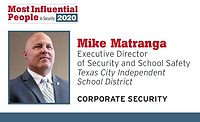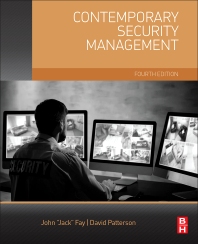Corporate Security
Security's Most Influential People in Security 2020 - Mike Wanik, CPP, CBCP
Senior Director, Corporate Security, United Therapeutics Corporation

In 2013, Michael W. Wanik became the first Security Director for biotechnology company United Therapeutics Corporation, a firm that develops products and solutions for patients with chronic and life-threatening diseases. The company is headquartered in Silver Spring, Md., with additional facilities up and down the East Coast as well as other global locations.
At United Therapeutics, Wanik built a security program and culture from the ground up. He standardized, unified and created an identity provisioning system across all company physical locations in concert with the collapse of several different access control platforms into one, supported by two security operation centers.
As part of a continual improvement process, Wanik is now leading an interoperability initiative at Research Triangle Park (RTP) campus in Durham, N.C. in concert with the RTP Foundation, businesses within the 7,000-acre science park, and public sector partners. “I began reviewing calls for service to the park by law enforcement, EMS, Fire and others in 2018 after noting degradation in response times. We learned through our partnership with the public sector that their assets were stretched and thus that the park was not routinely patrolled or familiarized with by responders,” Wanik says.
Shortly after he began his tenure at United Therapeutics, he became Chairman of “Security@RTP,” a committee of RTP Foundation’s Owners and Tenants Committee that shares knowledge and information between companies and law enforcement, regarding possible threats and related responses.
As Chairman, Wanik facilitates the communication to, coordination with, and response of Park companies and emergency management when safety for RTP’s roughly 55,000 employees may be of concern. The initiative just launched is the RTP-Communications Network (CN), and it’s currently in its pilot phase. The RTP-CN will bring select RTP security organizations together with public source partners through interoperability software that allows them to securely and privately share video, communications and mapping. Since the 7,000-acre park has no dedicated public safety resources yet, the platform will help in an easier transfer of data in an emergency situation between partners.
Previously, Wanik held executives roles at SSC Inc.; United Health Group; served in the U.S. Army; and taught law enforcement courses for Central Texas College Overseas in Stuttgart, Germany to armed forces members.
When asked what career advice he has for future security/law enforcement professionals, Wanik states that the current security landscape is one that is changing quickly. He explains, “Public and private organizations are experiencing extreme culture change, and this and ever-advancing technology will directly impact how we, in public and private organizations, will provide protective and investigative services. Law enforcement and the security professions will need to continue to strive to provide safe environments, deter criminal elements and act upon need as requested by others (to protect, detect, recover). Those that think rationally and critically, as well as utilize all the tools that are available to them will be the most successful. These tools don’t singularly reside in a police or corporate security department but are in our extended community of relationships as well. These relationships always pay dividends and help solve issues in ways we don't instantly think of.”
Looking for a reprint of this article?
From high-res PDFs to custom plaques, order your copy today!








